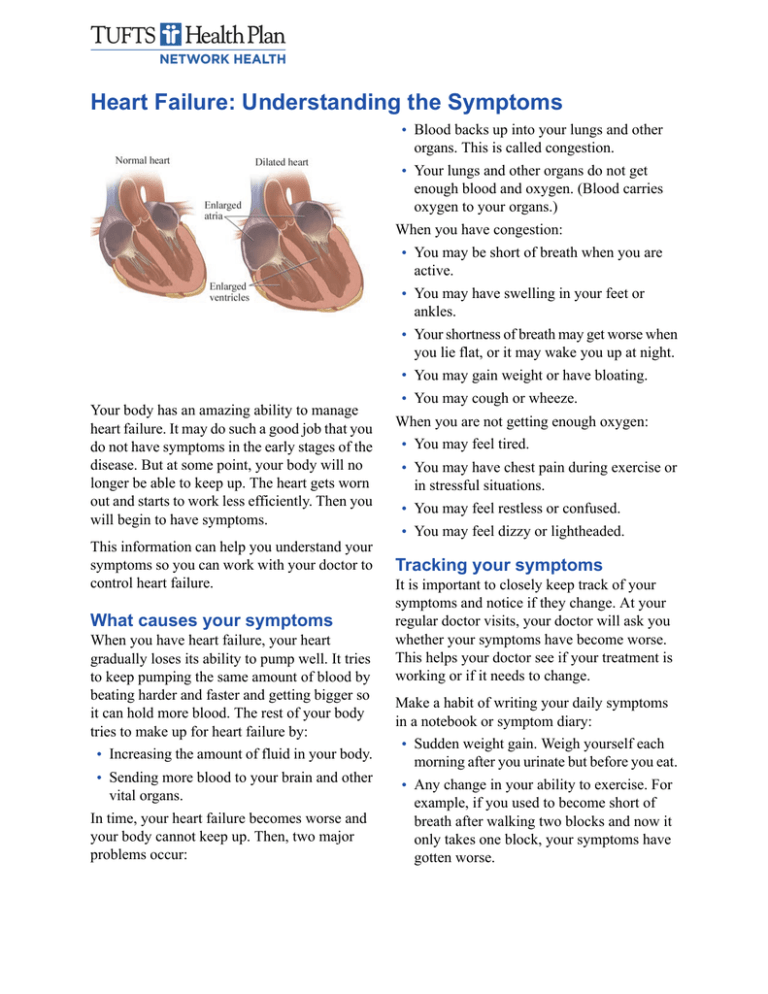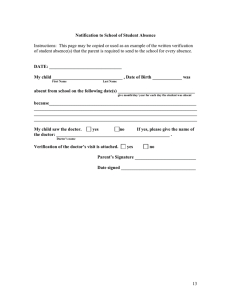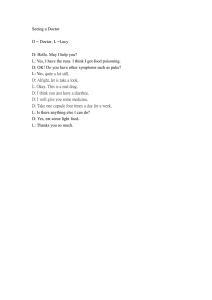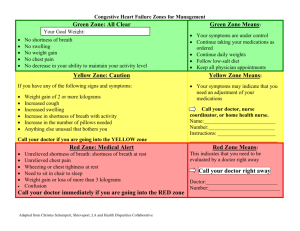Heart Failure: Understanding the Symptoms
advertisement

Heart Failure: Understanding the Symptoms • Blood backs up into your lungs and other organs. This is called congestion. • Your lungs and other organs do not get enough blood and oxygen. (Blood carries oxygen to your organs.) When you have congestion: • You may be short of breath when you are active. • You may have swelling in your feet or ankles. • Your shortness of breath may get worse when you lie flat, or it may wake you up at night. • You may gain weight or have bloating. Your body has an amazing ability to manage heart failure. It may do such a good job that you do not have symptoms in the early stages of the disease. But at some point, your body will no longer be able to keep up. The heart gets worn out and starts to work less efficiently. Then you will begin to have symptoms. This information can help you understand your symptoms so you can work with your doctor to control heart failure. What causes your symptoms When you have heart failure, your heart gradually loses its ability to pump well. It tries to keep pumping the same amount of blood by beating harder and faster and getting bigger so it can hold more blood. The rest of your body tries to make up for heart failure by: • Increasing the amount of fluid in your body. • Sending more blood to your brain and other vital organs. In time, your heart failure becomes worse and your body cannot keep up. Then, two major problems occur: • You may cough or wheeze. When you are not getting enough oxygen: • You may feel tired. • You may have chest pain during exercise or in stressful situations. • You may feel restless or confused. • You may feel dizzy or lightheaded. Tracking your symptoms It is important to closely keep track of your symptoms and notice if they change. At your regular doctor visits, your doctor will ask you whether your symptoms have become worse. This helps your doctor see if your treatment is working or if it needs to change. Make a habit of writing your daily symptoms in a notebook or symptom diary: • Sudden weight gain. Weigh yourself each morning after you urinate but before you eat. • Any change in your ability to exercise. For example, if you used to become short of breath after walking two blocks and now it only takes one block, your symptoms have gotten worse. • Any new or worsening symptoms and what might have caused them (for example, a high-sodium meal or exercising too hard). • What medicine or action you took that helped. Be sure your doctor has given you an action plan for when to call for help if you have certain symptoms. If you need to call your doctor, have your symptom diary handy so you can give your doctor's office this information. When to call your doctor Call 911 if you have symptoms of sudden heart failure, such as: • You have severe trouble breathing. • You cough up pink, foamy mucus. • You have a new irregular or rapid heartbeat. Call your doctor now or seek immediate medical care if: • You have new or increased shortness of breath (trouble getting your breath even when you are resting). • You are dizzy or lightheaded, or you feel like you may faint. • You have sudden weight gain, such as 3 pounds or more in 2 to 3 days. • You have increased swelling in your legs, ankles, or feet. • You are suddenly so tired or weak that you cannot do your usual activities. Watch closely for changes in your health, and be sure to contact your doctor if you develop new symptoms. Do you have any questions or concerns after reading this information? It's a good idea to write them down and take them to your next doctor visit. ©2007-2015 Healthwise, Incorporated. Healthwise disclaims any liability for use of this information, which does not replace medical advice. 2015-02-tb1494




